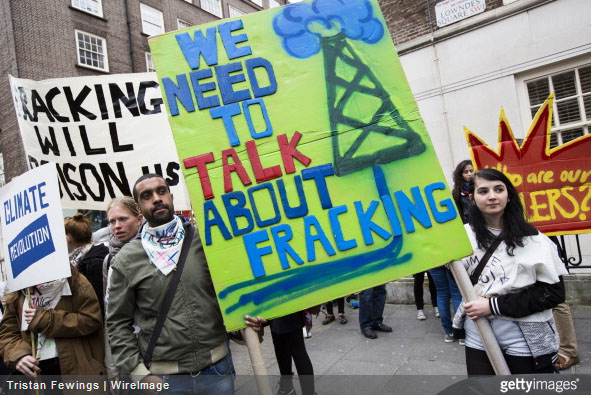Kate Aronoff, August 5, 2014, for Waging Nonviolence
As of last week, energy companies will once again be invited to explore and bid on shale gas reserves in the United Kingdom. Under “exceptional circumstances,” they can even submit applications to drill in national parks and world heritage sites. The decision lifts a three-year, nationwide ban on new licenses, and has prompted a range of responses from British anti-fracking organizers.
Clare Welton, an organizer with Fuel Poverty Action, connects this most recent news with broader austerity measures around services like healthcare and education.
“First, the national government hugely cut local councils’ budgets and now it’s essentially bribing them to take up fracking by offering lump sums of money,” she said.
According to the Association for Energy Conservation, fuel poverty is created when a family or individual spends more than 10 percent of their household income on essential heating costs. The United Kingdom has the highest rate of fuel poverty of the 13 Western European countries, ranking well below others on both quality and affordability.
As in the United States, government officials maintain that the proliferation of natural gas infrastructure will make vital energy services like heat and electricity more affordable for consumers. But, according to Welton, “Not even the fracking companies are saying that fracking will bring down the bills any more.”
In a 2011 report, the industry also conceded that fracking was a major cause behind a series of low-grade earthquakes on Britain’s western coast. The ensuing ban was due in large part to the efforts of both long-established organizations such as Friends of the Earth and more recent grassroots efforts like Frack Off U.K., which has staged direct actions at drill construction sites around the United Kingdom.
Just last week, a Frack Off branch in East Yorkshire was in a standoff with local police over a protest encampment they built on land owned by Rathlin Energy, which local residents fear will be opened to fracking. Similar “community protection camps” have cropped up around prospective injection well sites across Britain, showing the strength and organization of its growing anti-fracking movement.
By working closely with all the groups fighting this industry and the communities most impacted by the extractive economy, Welton said that organizations like hers are both resisting fracking and “pointing to the real solutions to our poverty-creating energy system: renewable energy owned by us, for us.”










